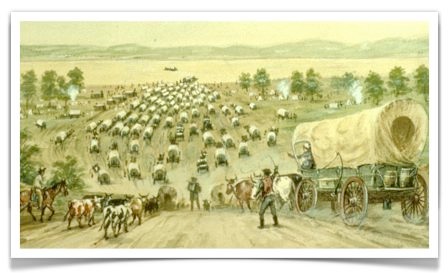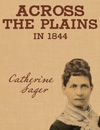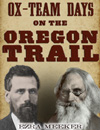Jumping Off
Starting the adventure of a lifetime

Jumping Off Cities
The Missouri River heads due west from St. Louis; so most emigrants loaded their wagons onto steamships for the upstream journey. It was easy traveling, but it didn't last long. Two-hundred miles from St. Louis, the Missouri takes a cruel turn to the north. So the pioneers unloaded their wagons at any one of several small towns along the Missouri river which they called "jumping off" places. Independence was the first option. Further upstream was Westport, St. Joseph, Omaha and Council Bluffs. The economies of these frontier towns depended on emigrants passing through, so many hired agents to go east and badmouth the competing cities.
Emigrant William Rothwell:
"I have never in my life heard as many false statements as were told us in coming up here. We were frequently told that at least 15 to 20 cases of cholera were dying daily in St. Joseph".
In reality, no one died of cholera in St. Joseph that year.
Each spring these small hamlets became raucous boomtowns--as thousands of emigrants camped for days, or weeks while getting ready to begin the journey. Independence was by far the most popular point of departure in the Trail's early years.
Emigrant/author Francis Parkman:
"A multitude of shops had sprung up to furnish emigrants with necessaries for the journey. The streets were thronged with men, horses and mules. There was an incessant hammering and banging from a dozen blacksmiths' sheds, where the heavy wagons were being repaired, and the horses and oxen shod. While I was in the town, a train of emigrant wagons from Illinois passed through--a multitude of healthy children's faces were peeking out from under the covers of the wagons."
Waiting
By mid April, the prairie outside Independence was packed with emigrant campers-- often over three square miles worth. It was so crowded, one emigrant spent four days just trying to find his friends. This entire mass of humanity was waiting for the grass to grow. Heading west too early meant the grass wouldn't be long enough for the animals to graze along the way--a mistake that could be fatal.
Supplies
Emigrant Lansford Hastings:
"In procuring supplies for this journey, the emigrant should provide himself with, at least, 200 pounds of flour, 150 pounds of bacon; ten pounds of coffee; twenty pounds of sugar; and ten pounds of salt."
A family of four would need over a thousand pounds of food to sustain them on the 2000 mile journey to Oregon. The only practical way to haul that much food was a wagon.
Wagons
Huge conestoga wagons were never used by the pioneers--they were just too unwieldy. Instead, the emigrants used small farm wagons. Although they appear simplistic, farm wagons of the 1840s were technologically-advanced vehicles. For example, the complex undercarriage centered around a kingpin, which allowed the front wheels to pivot, so the wagon could turn easily. And the front wheels are smaller than the ones in back--which also helped the wagons to round sharp corners.
Even the width of the wheels was carefully calculated. Wide wheels were more effective in soft, sandy soil. Narrow wheels worked better on hard surfaces. The cotton covers were typically drawn shut at both ends to keep out the incessant dust. To keep out the rain, the covers were treated with linseed oil, but most eventually leaked anyway.
The wagon box measured only four feet by ten feet. Most emigrants loaded them to the brim with food, farm implements and furniture--often over a ton of cargo.
All this was supported by massive axles. If one broke, the travelers were in serious trouble. Without a spare, they would be forced to abandon their wagon or reconfigure it as a two-wheeled cart.
Most wagons had several handy options: a toolbox on the side, a water barrel, and most importantly, hardwood brakes.
By late April or early May the grass was long enough--and the journey began.
Congestion
When it was finally time to go, everyone wanted to get started at the same time--and the result was often a huge traffic jam.
Even worse were greenhorns from cities back east, who had never before yoked an oxen or driven a mule team. They tipped their wagons, bumped into trees and couldn't even get their animals to go in the right direction.
Overpacking
Only a few miles outside of Independence, nearly all the emigrants realized they had grossly overloaded their wagons. Their only choice--start throwing things out.
The trail was so littered with this debris, that scavengers from the jumping off towns would collect full wagon loads of flour, bacon--even cast iron stoves.




